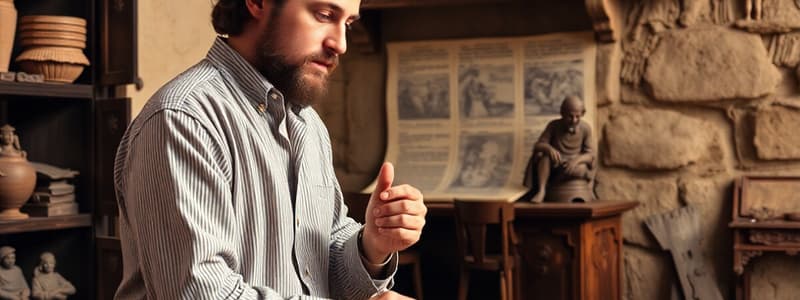Podcast
Questions and Answers
What is one of the items found in the bag that can give clues about its owner?
What is one of the items found in the bag that can give clues about its owner?
- A photograph
- A map
- A pin badge (correct)
- A book
The owner of the bag is known with certainty through the items found.
The owner of the bag is known with certainty through the items found.
False (B)
What does the letter found in the bag tell us about the possible location of the pen pal?
What does the letter found in the bag tell us about the possible location of the pen pal?
Mexico City
The primary activity proposed is to act as __________ detectives.
The primary activity proposed is to act as __________ detectives.
Match the items found in the bag with what they imply about the owner:
Match the items found in the bag with what they imply about the owner:
What is the primary role of a historian?
What is the primary role of a historian?
Artifacts provide no useful information about the cultures that made them.
Artifacts provide no useful information about the cultures that made them.
Name the two major types of sources used by historians.
Name the two major types of sources used by historians.
A historian must evaluate source materials to differentiate between ______ and opinion.
A historian must evaluate source materials to differentiate between ______ and opinion.
Match the following terms with their definitions:
Match the following terms with their definitions:
Which of the following is an example of a primary source?
Which of the following is an example of a primary source?
A historian's interpretation of information is solely based on their academic training.
A historian's interpretation of information is solely based on their academic training.
What are the steps a historian typically follows when conducting research?
What are the steps a historian typically follows when conducting research?
Flashcards
Historian
Historian
A student or writer who systematically studies the past.
Sources
Sources
Anything providing information to a historian.
Artifacts
Artifacts
Objects or tools used by past cultures.
Frame of Reference
Frame of Reference
Signup and view all the flashcards
Bias
Bias
Signup and view all the flashcards
Primary Source
Primary Source
Signup and view all the flashcards
Secondary Source
Secondary Source
Signup and view all the flashcards
Historical Detective
Historical Detective
Signup and view all the flashcards
Evidence
Evidence
Signup and view all the flashcards
Assumptions
Assumptions
Signup and view all the flashcards
Can a historian know for sure what happened in the past?
Can a historian know for sure what happened in the past?
Signup and view all the flashcards
Study Notes
Objectives
- Define Historian, Sources, Artifacts, Frame of reference, and Bias
- Outline the steps a historian takes
- Identify three types of sources
- Understand a historian's work through a "detective" activity
- Develop a greater understanding/appreciation of historical work
Who is a Historian?
- A student or writer who systematically studies the past
- Similar work to a detective
How Historians Acquire Information
- Anything providing information is a source.
Questions to Ask of a Source
- WHO?
- WHERE?
- WHAT?
- WHEN?
- HOW?
- WHY?
Types of Sources
- Written
- Oral
- Other
Artifacts/Artefacts
- Objects/tools used by past cultures
- Used to understand past people
Steps a Historian Follows
- Select a topic
- Collect source materials/research
- Evaluate source materials, distinguishing between facts and opinion. Objective work without bias is emphasized.
- Formulate a hypothesis/conclude.
- Record/report findings
Frame of Reference
- The way one interprets information
- Comes from:
- Life experiences
- Conversations
- Family
- Culture
- A historian's interpretation depends on their frame of reference
Historical Detectives Activity
- A bag containing various items is found.
- Clues from items are used to discover the owner's characteristics.
- This activity is an example of using evidence and artifacts to understand the past.
Example of a First Source
- Letter written by Angelina. Says to write back soon, love Angelina."
- This is a clue/piece of evidence/artifact to understand Angelina's characteristics
Example of a Historical Detective Scenario
- A letter, pen pal assignment, a pin badge, and a syringe
- These items provide clues to discover who the owner of the items and the bag was.
Final Thoughts
- Can a historian know for sure what really happened in the past? (Discussion/Guided Discussion Question)
- Complete worksheet on Facts and Opinions.
Studying That Suits You
Use AI to generate personalized quizzes and flashcards to suit your learning preferences.



